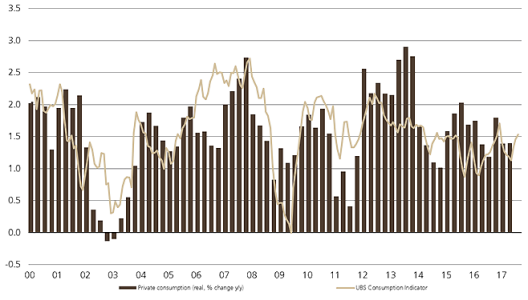The Swiss consumption indicator by UBS shows improvements. The indicator is still distant from the highs in 2012. At the time stronger growth in Emerging Markets and the weaker franc helped the Swiss economy.
The UBS consumption indicator increased to 1.53 points in August thanks to robust new car registrations and encouraging numbers of hotel stays by Swiss residents, indicating consumption growth slightly above the long-term average of 1.5%. However, the UBS economists still project 1.3% consumer spending growth for the year overall.
Zurich, 27 September 2017 – The UBS consumption indicator rose to 1.53 points in August. The original July value was revised up to 1.46 points. The consumption indicator was altered after the Federal Statistical Office revised consumption figures for previous years in late August.
Private consumption vs. UBS Consumption IndicatorNew car registrations in August boosted the UBS consumption indicator. August saw nearly 6% more new car registrations than the same month last year. The upward trend in overnight hotel stays by Swiss residents also helped. Overnight stays in July increased nearly 3% compared to July 2016. Overnight stays from January to July increased by almost 4% compared with the same period last year. Weak employment growth is still affecting the consumption indicator. In the second quarter, employment increased only 0.2%, well below the 1% average since 2000. The UBS consumption indicator shows slightly higher consumption growth in August than forecast by the UBS Chief Investment Office Wealth Management for the overall year. Due to weak employment growth in the first six months and the rise in inflation, consumer spending is not expected to increase more than 1.3% in 2017. |
Switzerland Private Consumption and UBS Consumption Indicator, August 2017(see more posts on Switzerland Private Consumption, Switzerland UBS Consumption Indicator, ) Source: ubs.com - Click to enlarge |
How the UBS Consumption Indicator is calculated
The UBS Consumption Indicator signals private consumption trends in Switzerland with a lead time of one to three months on the official figures. At more than 50%, private consumption is by far the most important component of Swiss GDP. UBS calculates this leading indicator from six consumer-related parameters: new car registrations, business activity in the retail sector, the number of domestic overnight hotel stays by Swiss residents, the consumer sentiment index, employment figures and credit card transactions made via UBS at points of sale in Switzerland. With the exception of the consumer sentiment index and employment figures, all of this data is available monthly.
Are you the author? Previous post See more for Next postTags: newslettersent,Switzerland Private Consumption,Switzerland UBS Consumption Indicator,U.S. Consumer Spending







































